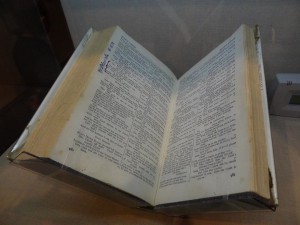This past weekend I went to see The Winter’s Tale at the Goodman Theatre. It’s not a Shakespeare that I’m super familiar with, and apparently isn’t staged very often. This could be for a number of reasons (including the issue of deciding how to handle the famous stage direction “Exit, pursued by a bear”) but is most likely due to the play’s shift from psychological drama/tragedy, to happily-ever-after-comedy. It’s a breach of genre.
I was curious to see how this production (directed by the renowned Robert Falls) would attempt to blend the two halves. The answer was: they didn’t. They went straight from the jealous wrongful accusation of Hermione, the resultant death of her young son Mamillus(who spends the first scene playing in a heavy bear costume), the banishment (and abandonment) of a newborn infant, the anger of Pauline and the too-late regret of Leontes to…comedic shepherds, thieving minstrels, young lovers, singing, dancing and sunshine. Even the set decoration changed dramatically. The first half—in Sicilia—was drawn in grays and blacks, straight lines, low lighting and ghostly reflections. But in the second half, Bohemia was all colorful, larger-than-life scenery: big fluffy sheep, a huge shepherd marionette, giant hay bales, and silly costumes. All this change happened in an instant—without even an intermission.
The contrast was at once absurd and delightful, and I was struck by the genius of it. Perhaps Shakespeare knew what he was doing by not putting this story in a genre box.
We’re big on literary labels these days. It’s more convenient when buying and selling books to put them in a category. I get that. But watching this play, I was thinking about how if we really wanted to portray life in fiction it wouldn’t fit into a category. Life is all in the same sentence both horrifying and hilarious, tragic and ridiculous.
I’ve talked before about my experiences with infant loss. I recall that after the first stillbirth of my seven months gestation baby girl due to a chromosomal abnormality, I developed a taste for comedy—sometimes twisted and irreverent. It occurred to me that having experienced such pointless tragedy it helped to be able to laugh at pointless things. Life doesn’t make sense, so why should art? After we lost our second baby to a different abnormality we joked with people that we were collecting chromosomal defects (who knows what we’d get next!). I don’t think most people thought this was funny, but we sure did.
Similarly, when in in the play Antigonus was chased off into the darkness by a vicious bear, and in the following scene his death was announced by dim-witted shepherds, the two of them tossing his bloody severed arm back and forth in some morbid slapstick gag, I admit, I laughed. Moments before I’d been angry, sad, serious and the next I was cracking up. There’s a reason why it’s called comic relief, I guess.
Still, even though the end did wrap up tidily—Hermione actually came back to life (or was alive all along) amends were made, young lovers united—there was a sense that happy endings don’t erase tragic beginnings. As the cheery party of people exited the stage, the curtain closed on the spectre of young Mamillus in the background, staring out at us in his bear costume as a reminder that behind our happiest moments are sad histories, behind joy is loss.

